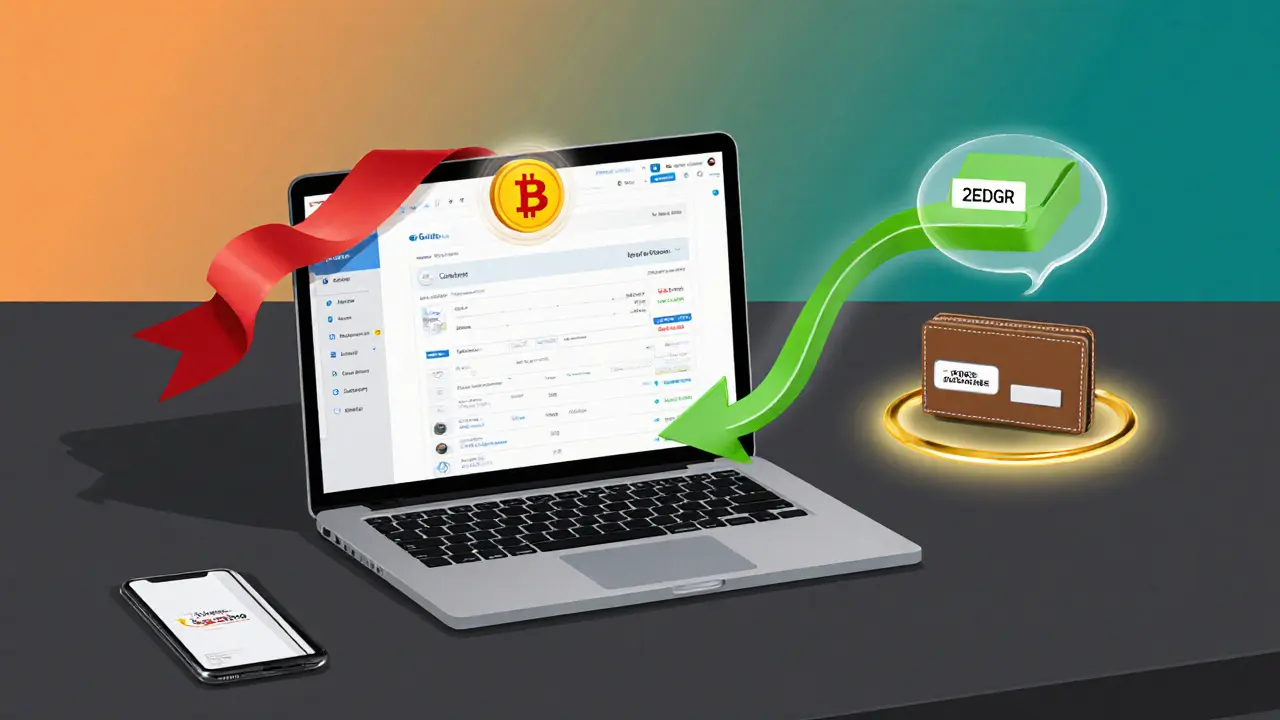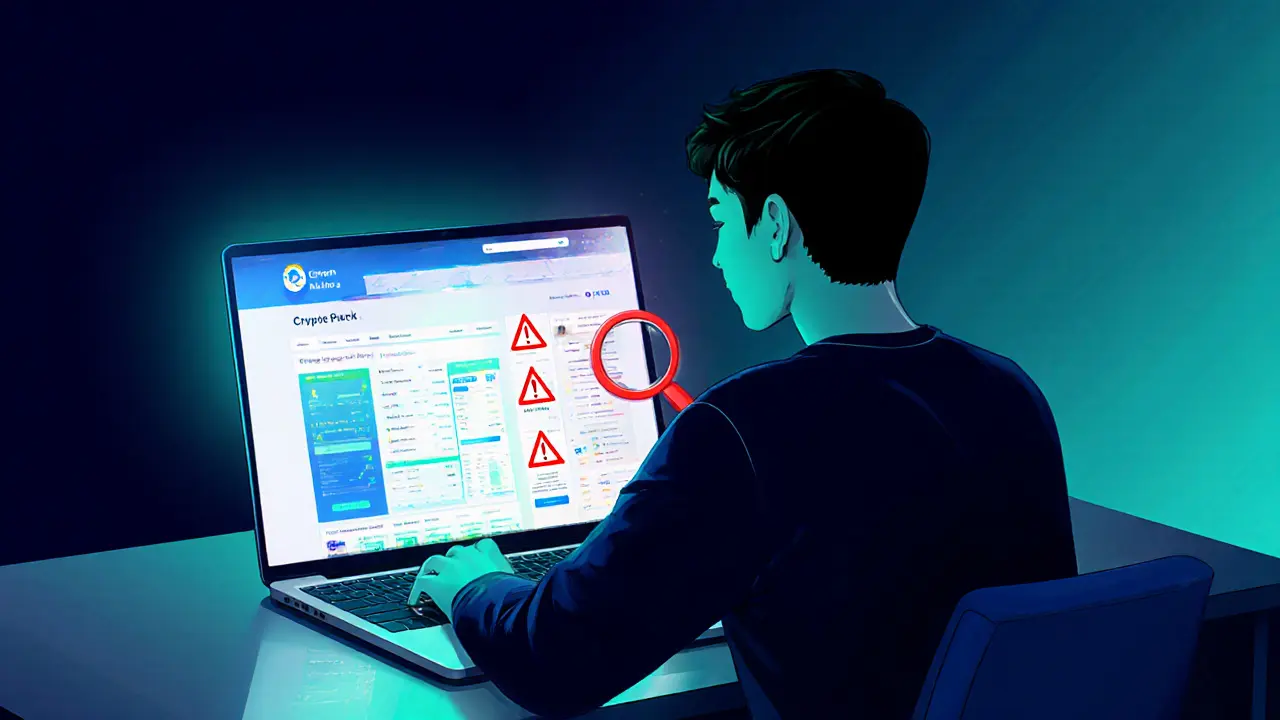Crypto Exchange Verification Checker
When a new crypto platform pops up, the first question is always the same: Is it legit or just another scam? This review breaks down what we know about EZ Exchange, why the lack of reliable data matters, and how you can protect yourself while deciding whether to trade there.
Quick Takeaways
- EZ Exchange has no publicly verified info on fees, security measures, or regulatory status.
- Key evaluation criteria for any exchange include licensing, KYC, security protocols, and user feedback.
- Red flags such as missing contact details, vague terms, and unusually low fees often signal fraud.
- Established platforms like Coinbase and Binance provide clear documentation that new exchanges usually lack.
- Start with a small test deposit, use hardware wallets, and avoid storing large sums on unknown platforms.
What Is EZ Exchange?
EZ Exchange is a cryptocurrency exchange that claims to offer a simple, low‑fee trading experience. However, despite a polished website, there are no verifiable records of its incorporation, licensing, or audited security practices. The platform does not appear on major exchange ranking sites, nor does it have a visible presence on regulatory registers in the US, EU, or NewZealand.
Because of this information gap, the safest approach is to treat EZ Exchange as an unverified entity until concrete evidence surfaces.
How to Verify Any Crypto Exchange
Before you click ‘Buy’ on any platform, run through this checklist. Each point can be backed by a specific attribute you’ll find on reputable exchanges.
- Regulatory Licensing: Check if the exchange is registered with a financial authority (e.g., FinCEN in the US, FCA in the UK, or ASIC in Australia). Legitimate platforms publish license numbers prominently.
- KYC/AML Procedures: A real exchange will require identity verification. Look for clear KYC steps, data‑privacy policies, and compliance with anti‑money‑laundering (AML) rules.
- Security Measures: Search for details on cold‑storage ratios, two‑factor authentication (2FA), withdrawal whitelist, and any third‑party security audits.
- Fee Transparency: Reputable sites list maker/taker fees, withdrawal fees, and any hidden charges. Compare them to known benchmarks (e.g., 0.1% maker on Kraken).
- User Reviews & Community: Browse Reddit, Trustpilot, and crypto forums. Genuine platforms have mixed feedback, while scams often have a flood of “too good to be true” testimonials.

Red Flags and Common Scams
Unfortunately, the crypto space still hosts a plethora of fake exchanges. Here are the most common warning signs that you should treat as a deal‑breaker.
- Domain age less than six months or a recently changed WHOIS record.
- No clear corporate address or contact email; only a generic support form.
- Promises of guaranteed returns or “zero‑fee” trading across all assets.
- Absence of SSL/TLS certificates (look for https:// in the URL).
- Pressure tactics urging you to deposit quickly to “lock in” a price.
These characteristics appear frequently in the listings compiled by watchdog groups that maintain “ultimate lists of fake crypto exchanges.”
EZ Exchange vs. Established Platforms - A Quick Comparison
| Attribute | EZ Exchange | Coinbase | Binance | Kraken |
|---|---|---|---|---|
| Regulatory Licensing | Unknown | US FinCEN, NYDFS, EU MiCA pending | Malta VFA, Singapore SFC license | US FinCEN, UK FCA |
| KYC Required | Not clearly stated | Yes - ID, proof of address | Optional for low limits, mandatory for full access | Yes - ID verification |
| Security Features | Unclear - no audit reports | Cold storage 98%, 2FA, insurance fund | SAFU fund, cold storage, 2FA | Cold storage >95%, 2FA, PGP email verification |
| Fee Structure | Not published | 0.5% maker/taker (lower with volume) | 0.1% maker, 0.1‑0.2% taker | 0.16% maker, 0.26% taker |
| Supported Coins | Unclear - website lists a few major pairs | 100+ assets | 600+ assets | 250+ assets |
| User Base (2025) | Not disclosed | 73million | 150million | 12million |
Notice how many fields for EZ Exchange are marked “Unknown” or “Unclear.” That’s a red flag in itself. Established platforms are transparent because they operate under strict regulatory oversight.
Safe First Steps If You Still Want to Test EZ Exchange
Curiosity isn’t a bad thing, but exposure should be limited. Follow this low‑risk process:
- Create a new email address solely for cryptocurrency activity.
- Enable two‑factor authentication on your device and on the exchange (if offered).
- Deposit the smallest possible amount - for example, $10 worth of Bitcoin.
- Attempt a simple trade (e.g., BTC→USDT) and note execution speed and fees.
- Withdraw the entire balance back to a personal hardware wallet (e.g., Ledger Nano X).
- Document every step with screenshots. If anything feels off, cease further activity immediately.
By limiting exposure, you protect yourself while gathering real‑world data about the platform’s performance.
Bottom Line
EZ Exchange currently operates in a data vacuum. Without clear licensing, audited security, or fee disclosures, it sits on the risky side of the crypto exchange spectrum. Use the verification checklist above for any new platform, and treat unknown services with the same caution you’d apply to a stranger offering a huge return. When in doubt, stick with regulated, transparent exchanges that have proven track records.

Frequently Asked Questions
Is EZ Exchange a legitimate crypto exchange?
At the time of writing, there is no verifiable information about EZ Exchange’s licensing, security audits, or user base. Without such data, the exchange should be considered unverified and potentially unsafe.
What red flags should I look for in a new crypto exchange?
Common warning signs include a brand‑new domain, vague contact info, promises of guaranteed profits, hidden fee structures, lack of SSL, and aggressive marketing urging immediate deposits.
How can I verify if an exchange is regulated?
Check the exchange’s website for license numbers and cross‑reference them with the regulator’s official register (e.g., FinCEN, FCA, ASIC). Reputable platforms also publish compliance reports.
What are the safest ways to store crypto purchased on a new exchange?
Transfer the assets to a hardware wallet you control, such as Ledger or Trezor, as soon as the deposit confirms. Avoid leaving large balances on any exchange, especially an unverified one.
Can I rely on user reviews to judge an exchange?
User reviews are useful but can be manipulated. Look for consistent themes across multiple platforms (Reddit, Trustpilot, Twitter). Balanced feedback-both positives and negatives-usually indicates authenticity.


20 Responses
Reading through the EZ Exchange review really makes you think about the kind of due diligence we all should do. The lack of licensing info is a huge red flag, especially when you consider how regulated platforms proudly display theirs. If you’re new to crypto, start with a tiny deposit and keep the bulk of your assets in a hardware wallet. Remember, it’s better to be safe now than regret a loss later.
Honestly, looks like another sketchy site. I’d stay away.
Hey folks, great summary! I love how you laid out the checklist – it’s super helpful for anyone dipping their toes in. Keep the optimism flowing and stay vigilant.
Wow!!! This review hits all the scary points!!! No licensing, no clear fees, no security details!!! It’s basically a warning sign!!!!
Let’s break it down together, team. The main takeaways are the missing regulatory details and the opaque fee structure. Start with a throw‑away amount, move the coins to a Ledger, and watch how the platform behaves. Sharing experiences like this helps everyone stay safe.
TL;DR: No proof, no trust. Use reputable exchanges. :)
From a practical standpoint, the absence of verifiable compliance documents is concerning. While the UI looks slick, formality matters when handling your assets. It might be worth reaching out to their support to ask for license numbers – if they’re reluctant, that’s a red flag. Also, consider the opportunity cost of locking funds in a potentially unsafe vault.
The epistemological framework governing exchange legitimacy necessitates a confluence of regulatory transparency, cryptographic security protocols, and market operational integrity.
In the case of EZ Exchange, the ontological vacuum manifested through absent licensing data, obfuscatory KYC statements, and indeterminate fee matrices precipitates a systemic risk vector.
Such lacunae undermine the fiduciary trust model that underpins decentralized finance ecosystems.
Empirical analysis of comparable platforms demonstrates a statistically significant correlation between disclosed compliance mechanisms and user retention rates.
Moreover, the cryptoeconomic incentive structures rely heavily on auditability, which is conspicuously missing in this instance.
The absence of cold‑storage ratios and third‑party penetration testing further amplifies the exposure to adversarial exploits.
From a risk‑adjusted return perspective, allocating capital to an entity with unknown custodial safeguards contravenes prudent portfolio diversification principles.
Regulatory arbitrage, while occasionally leveraged for competitive advantage, must be balanced against potential legal ramifications within jurisdictional frameworks.
The geopolitical implications of operating without a clear licensing regime also entail heightened scrutiny from anti‑money‑laundering authorities.
Users should therefore institute a layered security posture, encompassing hardware wallet isolation and incremental deposit strategies.
Benchmarking against industry standards such as the FCA, FinCEN, and ASIC provides a heuristic for assessing exchange credibility.
In practice, engaging with exchanges that publish third‑party audit reports and maintain transparent fee disclosures reduces asymmetrical information asymmetry.
Consequently, the prudent course of action entails either abstaining from EZ Exchange or relegating exposure to a negligible fraction of one’s overall crypto allocation.
Continuous monitoring of community sentiment on platforms like Reddit, Trustpilot, and specialized forums can yield early warning signals.
Ultimately, the decision matrix should weigh the opportunity cost of potential gains against the existential threat posed by an opaque operational model.
I totally agree with the points raised above. Adding a hardware wallet to your workflow is essential, especially when the exchange’s security claims are vague. Even a small test deposit can reveal hidden withdrawal fees or sluggish processing times. Documenting every step gives you evidence should anything go awry. If the platform passes these rudimentary tests, you might consider a marginally larger allocation, but never go all‑in without solid proof of compliance.
Ever wonder why these shadowy exchanges pop up exactly when regulatory bodies tighten their grip? It’s not a coincidence. Some think there’s a coordinated effort to funnel unsuspecting users into opaque ecosystems that feed into larger, undisclosed networks. The lack of transparency might be intentional, designed to evade oversight. Keep your eyes peeled; the pattern repeats.
Balancing optimism with caution is key. While new platforms can bring innovation, the absence of solid regulatory signals should give anyone pause. Treat EZ Exchange as a hypothesis: test it lightly, gather data, and decide based on evidence rather than hype.
Seriously, the energy behind this review is fire! If a platform can’t show its licenses, that’s a major red flag. Don’t get burned – stay sharp and protect your assets!
Appreciate the thorough breakdown, it really helps newcomers navigate the minefield. Keep spreading the knowledge and let’s keep the crypto community safe together.
Yo, just a heads up – if you’re thinking about trying this out, start with like $5 or $10 max. Keep it in a hardware wallet ASAP. Don’t get caught up in the hype.
Look, we’re Americans, and we’ve built some of the strongest financial systems. Let’s support home‑grown platforms that play by the rules instead of these sketchy overseas sites.
It’s always good to stay curious, but remember that not every new exchange is a hidden treasure. A balanced approach-small trial, thorough research, and quick withdrawal-keeps you safe while you explore.
Avoid it. 😊
Your caution is well‑placed, but let’s also consider the broader ecosystem. Even if EZ Exchange is currently opaque, it could evolve and adopt best practices. However, the risk‑reward ratio now heavily leans toward risk, especially for users without deep technical expertise. Maintaining a diversified portfolio across vetted exchanges mitigates potential losses. Continual monitoring of regulatory updates can alert you to any shifts in the platform’s status.
Bottom line: stick with regulated exchanges that publish audit reports and licensing info.
Sure, the article paints EZ Exchange as a red flag, but every new platform starts somewhere. Dismissing it outright could blind us to potential innovation.